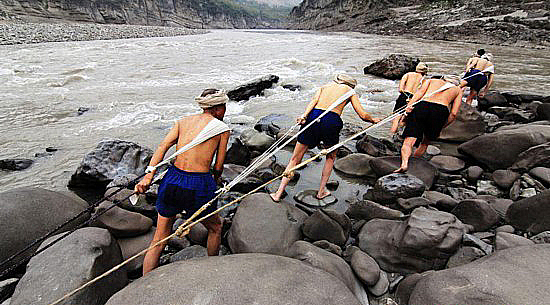Rapid cultural changes threaten folk literature

Boat trackers’ chants were sung by laborers to regulate the pace of their work when pulling stranded boats. Over thousands of years, this vocal art has been enriched with great historical and cultural value. However, it is vanishing in the torrent of the modernizing agricultural production. Photo: NEWSSC
Rapid economic and social development has caused substantial changes in the inheritance of folk literature. Scholars discussed related issues at a recent training class for inheritors of intangible cultural heritage in folk literature, which was sponsored by China’s Ministry of Culture and Tourism.
Lin Jifu, a professor from the Minzu University of China, said that urbanization is distancing people from folk literature, while rapid development of the internet and new media have decreased its appeal. Moreover, the modernization of agricultural production has caused some forms of folk literature attached to the traditional mode of agricultural production to vanish, such as boat trackers’ chants, sung by laborers to regulate the pace of their work when pulling stranded boats.
Video platforms have taken over almost all grassroots cultural markets due to the prevalence of online video culture characterized by body language, causing a severe impact on folk literature, said Shi Aidong, a research fellow from the Institute of Literature at the Chinese Academy of Social Sciences.
Cao Daming, vice dean of the National College of China Three Gorges University, said that the disappearing traditional ecological elements and the changing social lifestyles of modern society have altered the cultural ecology of grassroots folk literature while reducing the importance of grassroots folk literature in people’s daily life.
Cao explained the recent work being done to protect grassroots folk literature. Researchers have comprehensively collected and recorded the texts and preserved them in physical or digital form, while designating and protecting a batch of inheritors of grassroots folk literature. Meanwhile, they have conducted in-depth research on some aspects of grassroots folk literature works, such as cultural connotations and functions.
In Cao’s view, innovation in the content and form of folk literature is needed to adapt to the new cultural ecology and social demand. Folk literature needs to be written that reflects the social transition of the new era and that conforms to contemporary aesthetic values and tastes. It is necessary to produce folk literature that can be widely spread through the utilization of modern technology and new media.
Lin said that inheritors’ role in the transmission of intangible cultural heritage in folk literature must be stressed. Measures should be taken to raise inheritors’ cultural influence in local areas and encourage them to take the lead in promoting the inheritance of folk literature.
(edited by JIANG HONG)
